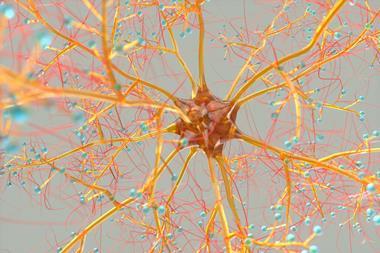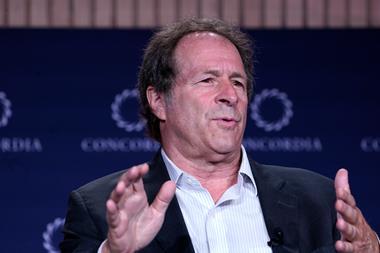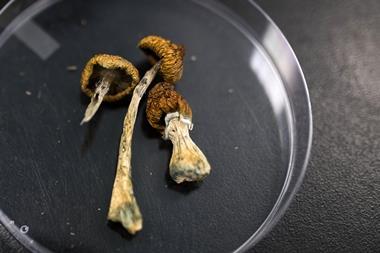Authorised psychiatrists in Australia can now prescribe MDMA for post-traumatic stress disorder (PTSD) and psilocybin for treatment-resistant depression. But as this sea change in treatment takes place, experts in the field have expressed concerns that strict licensing rules around psychedelic drugs has left the UK trailing behind other countries to the detriment of those who could benefit from them. ‘We’re so far off the pace now,’ David Nutt, professor of neuropsychopharmacology at Imperial College London, told Chemistry World.
In Australia, the decision to approved MDMA, the active component of the drug ecstasy, and psilocybin derived from ‘magic mushrooms’ was a consequence of the lack of options for patients with specific treatment-resistant mental illnesses. Psychiatrists wanting to prescribe these drugs will need to be approved by the Australian medicines regulator following approval by a human research ethics committee. The scheme allows prescribing permissions to be granted under strict controls that ensure the safety of patients.
The approval means that psilocybin and MDMA can be used therapeutically in a controlled medical setting. For these specific uses, psilocybin and MDMA will be listed as controlled drugs. For all other uses, they will remain prohibited substances which largely restricts their supply to clinical trials.
However, the move has been met by criticism by some experts who say the decision could expose patients to unnecessary risks as the safety and efficacy of these treatments is still being explored in clinical trials.
‘It is a significant cause for concern,’ says James Rucker, a consultant psychiatrist and senior clinical lecturer at King’s College London who has led a number of studies investigating the safety and efficacy of psychedelic drugs. ‘It sends entirely the wrong message to the public, encouraging unsafe non-medical use.’
Rucker says the decision also undermines the credibility of Australia’s medicines agency by ‘short circuiting’ their own regulatory processes and the internationally agreed clinical trials process. ‘It exposes patients to unnecessary risks. It exposes clinicians to risks. It is an illogical and short-sighted decision that repeats the mistakes of history,’ he adds.
In the UK, psychedelic drugs including MDMA and psilocybin are defined as schedule 1 under the Misuse of Drugs Regulations 2001, which means that a costly Home Office licence is generally required for their production, possession or provision. Schedule 1 is defined as including drugs that are ‘not used medicinally’. In contrast, drugs such as heroin and cocaine are listed under the less restrictive schedule 2.
But, Nutt says that the current scheduling of psilocybin in the UK has ‘destroyed’ research in this area. ‘In 2014, my group published the first study of psilocybin for treatment resistant depression – it was a revolutionary treatment [but] we’ve been hardly able to do any research since because it’s been very difficult and very expensive,’ he explains. ‘There are universities who just refuse to get the licence because it’s tedious, complicated, costs money, sometimes thousands, depending on how much you [need to] change the room to have safes installed.’
‘I can hold fentanyl, heroin and cocaine in my drug safe or in the pharmacy at the hospital but I can’t have psilocybin there, because it’s a schedule 1 drug which means its “unsafe”. It is absurd.’
In May, 15 leading psychiatrists, with the support of organisations such as the Royal College of Psychiatrists, the Campaign Against Living Miserably, and Drug Science, put out an urgent call to the UK government to ‘act swiftly’ to move psilocybin from schedule 1 to schedule 2. This would remove ‘unnecessary and burdensome restrictions on clinical research efforts with the compound’.
In their letter to the UK drugs minister they said: ‘It is unethical to wait any longer. Psilocybin’s schedule 1 designation is not morally, medically or economically appropriate.’
The groups highlighted that, with the rescheduling, psilocybin would be treated as any other schedule 2 drug, except that it could not be prescribed outside research authorised by the Medicines and Healthcare products Regulatory Agency (MHRA) and therefore security and safety would not be compromised. ‘We’ve been calling for this change for a decade,’ says Nutt, who led the call.
‘The government was supposedly looking into it four or five years ago,’ says Nutt, ‘[but] it’s very easy to pass the buck because there are at least three separate organisations involved – the Home Office, which of course controls the scheduling, the Department of Health, which has to decide whether these drugs have medical value, and there is the Advisory Council on the Misuse of Drugs, which is a ping pong between the two.’
‘The reason for this debate is that people are just getting sick of it,’ he adds. ‘The scheduling does not protect the public from the harms of these drugs recreationally, all it’s doing is denying treatment to patients and researchers access to the drugs – it is truly the worst of all possible worlds.’
Rucker agreed with the call for rescheduling but said there should be ‘special restrictions’ so that the drugs can only be used in clinical trials until a licensing decision was made by the MHRA.

















No comments yet